Smoking and dental treatment often conflict with each other. But today, we are not talking about the hazards of nicotine, but about the first suction after dental procedures. Can I smoke immediately after tooth extraction? How long does it take to smoke without worrying about hurting yourself? What are the harms of smoking after tooth extraction? You will find the answers to these questions in this article.
Treatment measures
After the tooth is extracted, the open wound remains in the wound. If the wisdom tooth is extracted, a large wound will remain. In order to stop the bleeding, the dentist should close the wound with a cotton swab soaked in the liquid medicine, which should be removed after 20 minutes. After removing the wool, a small blood clot will form in the hole of the missing tooth. Do not remove it. The clot is a guarantee of bone tissue regeneration and promotes the rapid healing of fresh wounds.
Do not try to remove blood clots from the hole: this is necessary for rapid tissue regeneration.
The dentist will treat the hole with a healing compound, and after removing the wisdom tooth, he should take a course of antibiotics. But antibiotics are not prescribed in all cases, but surgery is performed on molars with curved or overgrown roots.
When forming a larger wound surface, sutures can be used. In this case, the first puff can only be done 2 or 7 days after the procedure. It all depends on the organization's resilience. Within the specified time period, the seam will be healed and the doctor will remove the surgical thread.
The role of nicotine
Everyone has heard of the impact of reduced nicotine on horses’ lives, but they still continue to smoke. How does addiction affect teeth and oral health? Facts have proved that nicotine can cause great damage to mucous membranes, throat and lungs. Nicotine can irritate the mucous membranes, cause various diseases of the oral cavity, and promote tooth decay.
Cigarette smoke contains many different resins and chemicals, which can inhibit tissue healing. The situation is complicated by the penetration of the listed substances into the blood through saliva. During the suction process, many toxic substances enter the human body, including hydrogen cyanide and hydrocyanic acid.
Nicotine and cigarette smoke are toxic to oral tissues. Smoking is only allowed after the injured mucosa has fully recovered.
Nicotine can relieve pain and relieve tension by stimulating the production of pleasure hormones. However, the damage to the body goes far beyond that. This should not be forgotten when proving your habit with painkillers.
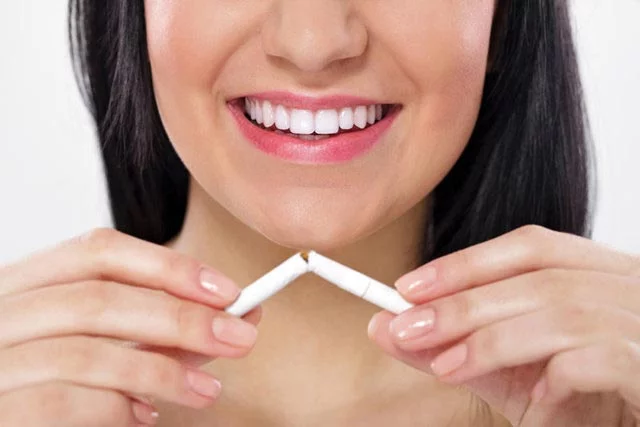
Negative effects of smoking after tooth extraction:
- The development of inflammatory process in oral tissue;
- The development of the inflammatory process in the cavity-alveolitis;
- Blood pressure rises, clear blood clots.
Scientific experiments do not support the beneficial effects of nicotine on stress relief. In fact, cigarette smoke can create the illusion of relieving stress, which actually aggravates the negative performance on the physiological level:
- Tachycardia;
- Angina;
- Increased breathing;
- Violation of creep function;
- Muscle tension.
Therefore, after removing the molars, smoking should be avoided as much as possible, preferably for a few days. The carcinogens contained in tobacco smoke deposit layer by layer on the wound surface, causing great harm to health.
Algorithm
The first hazard of inhaling cigarettes after surgery: nicotine can dry the well. For timely and successful tissue regeneration, a humid environment is required. However, cigarette smoke can cause mucous membranes to dry out, which negatively affects the wound surface of the hole.
Dry holes are a testing ground for the activity of pathogenic bacteria that quickly trigger the inflammatory process. In severe cases, the inflammatory process will end with severe disease alveolitis. Through this pathology, the wall of the hole formed after removal of the molar becomes inflamed.
Causes of alveolitis:
- Damage to tissue integrity due to injury;
- Fresh wound infection;
- Violates blood coagulation kinetics.
Symptoms are similar to human poisoning, pathogenic bacteria waste:
- muscle soreness;
- Headache;
- Nausea and weakness.
In addition to the general symptoms of poisoning, there will also be characteristic signs of histopathology of the gums: mucosal edema, facial muscle edema caused by inflammation. Osteomyelitis with fistula formation with continuous outflow of pus can become a complication of alveolitis.
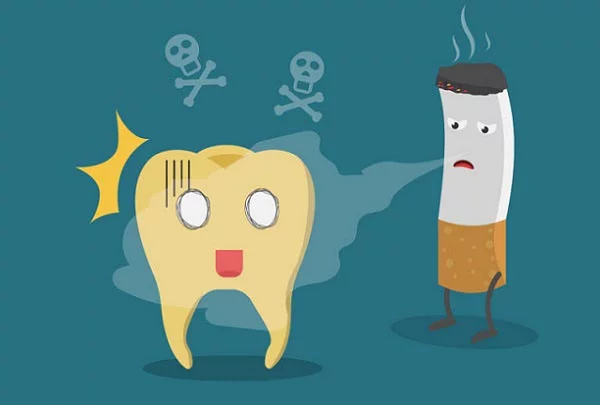
Blood pressure
Smoking temporarily raises blood pressure, which may cause the clot covering the socket to simply "pop". This threatens the development of the inflammatory process due to infection of open wounds. The chemicals in cigarette smoke contract the lumen of blood vessels, thereby increasing blood pressure. Vasoconstriction prevents adequate nutrition of mucosal tissues, thereby slowing down the regeneration process.
HOISTANA smoking, VIPING
I believe that because of the use of refined tobacco, waterpipes are less harmful to smokers. Is that right? Purification of tobacco smoke does cause less damage to health, but it also has the same negative impact on the wound surface. It is deposited on the mucous membranes, interferes with normal blood circulation and triggers inflammatory processes.
The ban on electronic analogues of cigarettes and hookahs-wipes-is also effective. No resin will be released during the wiping process, but other toxic substances will be formed. They are stained with mucus and wound surfaces, harming smokers.
Erase composition:
- Diacetyl;
- Glycerin;
- Propylene glycol;
- Taste.
Diacetyl aromatics have special hazards and are toxic when heated in cigarette batteries. The right amount of this substance is not harmful to health, but if it is continuously heated and consumed, it will cause severe lung disease.
Inhalation of smoke can cause the oral mucosa to dry out, which opens the way for the reproduction and harmful effects of pathogenic bacteria.
Propylene glycol causes allergies and accumulates in mucosal tissues. The substance has a stimulating effect on the mucous membrane, causing inflammation and other pathologies. At high temperatures, glycerin and propylene glycol will form harmful formaldehyde and acrolein.
The use of a wet wipe by several smokers can cause the spread of infectious diseases, hepatitis, and tuberculosis. If different people use the same pipe, the same can be said for hookahs.
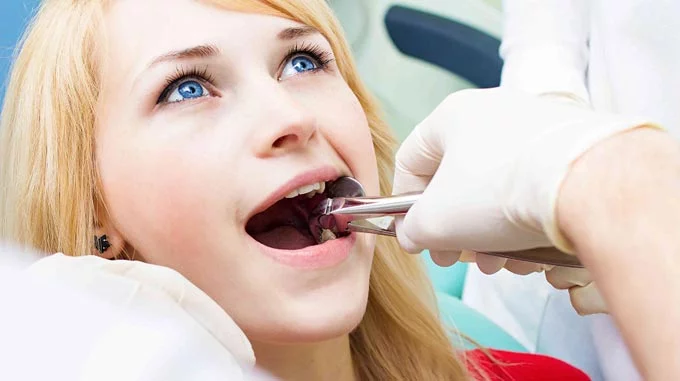
Dental advice
If non-smokers have no special problems, smokers cannot perform many dental and orthodontic procedures. Smokers should not undergo surgery to enlarge jaw tissue, suture soft tissue or implant implants. During the tightening process, the sutures may separate and the implant may fall. However, you still have to follow the preventive measures and strictly follow the dentist's advice, and you can achieve results among smokers.
Doctor's advice
- The cotton swab with the antibacterial agent can be removed 20 minutes after the tooth is removed. If this is not done, the bacteria will start to multiply.
- Carefully rinse your mouth with antiseptic to avoid accidentally removing the protective ball from the hole.
- It is best to use a solution with a tray instead of the usual mouthwash-keep the solution in the mouth, and then spit it out carefully;
- If the doctor puts the medicine in the hole, it is not allowed to remove it without permission;
- The first oral hygiene can only be performed on the second day after resection;
- If the doctor prescribes a course of antibiotics, you should continue;
- In case of severe pain, it is recommended to take anesthetics, you do not need to endure gum discomfort.
If the purge operation is successful, you can perform the first puff in a few hours. Take at least 2 hours to keep yourself away from the idea of smoking.
If the bleeding has not stopped after 2 hours, smoking should not be considered. Blowing hard will increase bleeding, so you will have to seek other medical help.
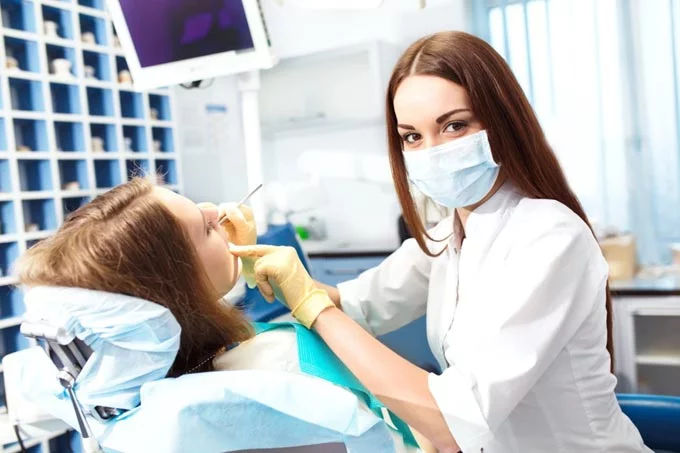
Prohibited content
- Clean and rinse your mouth 24 hours after removal;
- Take a steam bath, take a hot bath, sunbathe in the solarium-higher temperatures will increase bleeding from the wound;
- Work out in health clubs, gyms and sports fields-until the wound heals and the seams dissolve;
- When sewing the needle, not only tighten it, but even open the mouth with a smile, the needle will quickly spread out.
- After stress, you can only eat snacks after 2-3 hours; it is also not recommended that you drink liquids (or carefully through a straw);
- Alcohol is strictly forbidden-it will thin the blood strongly and the wound will begin to bleed;
- You cannot drive on this day, it is best to take a taxi.
After a while, you will have to give up the usual spicy, savoury, and very hot/cold dishes. This means you cannot eat ice cream, drink cold fruit drinks or freshly brewed coffee. Pickled mushrooms and pickles have also been banned for a while, and it is recommended to abandon smoked meat.
You also need to give up rough foods: croutons, hard fruits, vegetables. You cannot keep carrots and turnips for several days. Food should be soft, without salt and pepper. You will have to diet for a few days until the tissue is completely healed.
What do you need to do
- If the pain disappears, apply ice to the cheek-but keep this pressure for no more than ten minutes;
- Warm herbal baths-they can soothe damaged tissues, relieve swelling, and eliminate pain;
- Take painkillers, anti-inflammatory drugs, but aspirin and analgesics-they thin the blood.
If you are receiving medication, you must tell your dentist. He will adjust the drug intake. Some drugs can affect the viscosity of blood and cause bleeding, so they should be temporarily abandoned.
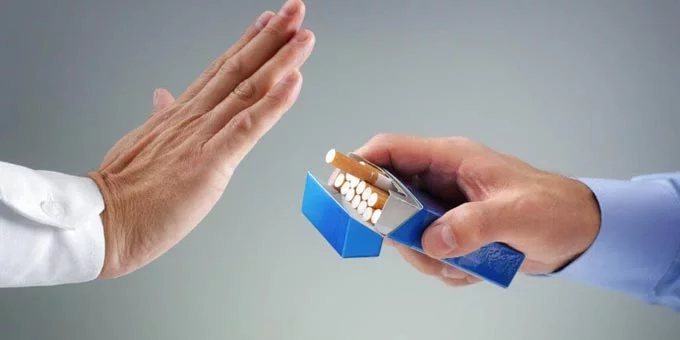
Total
Cigarette smoke stimulates various pathological conditions and hinders the rapid healing of damaged tissues. Therefore, it is impossible to continue dragging after several hours after removing the molars and when suturing the gums-several days. The smoke contains many toxic substances, which can enter the damaged shell and cause injury.
Moreover, tobacco smoke will dry out the mucous membranes, which poses a danger to the blood cells in the pores-it is responsible for restoring tissue integrity and preventing microbial penetration.























